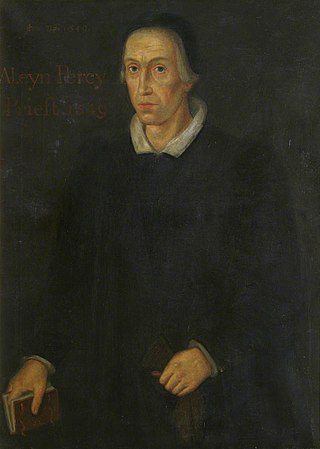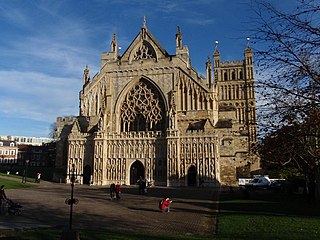Related Research Articles

Godfrey Goldsborough was a Church of England clergyman and bishop of Gloucester from 1598 to 1604. He was educated at Trinity College, Cambridge. He also served as a Prebendary of Worcester.
Thomas Sampson was an English Puritan theologian. A Marian exile, he was one of the Geneva Bible translators. On his return to England, he had trouble with conformity to the Anglican practices. With Laurence Humphrey, he played a leading part in the vestments controversy, a division along religious party lines in the early years of the reign of Elizabeth I of England.
Thomas Paske was an English clergyman and academic, deprived as a royalist.

John May (Meye) was an English academic and churchman, who became Bishop of Carlisle. He also served the House of De Vere as cleric in Buckinghamshire.
Rowland Meyrick (Merrick) (1505–1566) was a Welsh bishop of Bangor.

William Stanley (1647–1731) was an English churchman and college head, Master of Corpus Christi College, Cambridge, Archdeacon of London and Dean of St Asaph.
Nicholas Robinson was a Welsh Bishop of Bangor and correspondent of Lord William Cecil, Sir Francis Walsingham, and Robert Dudley, 1st Earl of Leicester.

Alan Percy (c.1480-1560) was an English churchman and academic, Master of St John's College, Cambridge, and later Master of Trinity College, Arundel which he surrendered to Henry VIII in 1545.
Antoine Rodolphe Chevallier (1523–1572) was a French Protestant Hebraist and a holder of teaching positions in England. He acted as tutor in French and Hebrew to the future Elizabeth I of England.
Anthony Belasyse, also Bellasis, Bellows and Bellowsesse was an English churchman and jurist, archdeacon of Colchester from 1543.
Lancelot Ridley, was an English clergyman, known as a theological writer, and rector of St James' Church, Stretham, Cambridgeshire.

Thomas Yale (1525/6–1577) was the Chancellor, Vicar general and Official Principal of the Head of the Church of England : Matthew Parker, 1st Lord Archbishop of Canterbury, and later on, of Edmund Grindal, the 2nd Archbishop, during the Elizabethan Religious Settlement. He was also Dean of the Arches and Ambassador to Queen Elizabeth Tudor at the Court of High Commission.
Thomas Langley was an English clergyman who rose to the position of canon of the 9th prebend of Winchester cathedral, which he held between 1559 and his death in 1581/82. In 1546, he translated parts of the De rerum inventoribus by Polydore Vergil, and in 1552 a treatise on the Sabbath written in Italian by Giulio da Milano. He also wrote Latin verses in 1559 for William Cunningham’s Cosmographical Glass.
John Fuller was the master of Jesus College, Cambridge. As bishop's chancellor in Ely, Cambridgeshire, he was charged with suppressing Christian heresy, condemning several heretics to be burnt at the stake.
Benjamin Heydon or Haydon (1567–1607) was the Headmaster at Winchester College from 1596 to 1601/1602, a JP for Somerset, and Dean of Wells Cathedral from 1602 until his death in 1607.

Thomas Boleyn, LL.B, , was the Master of Gonville Hall, Cambridge from 1454 to 1472, the seventh to hold that position. During the later 1440s, through three separate acts of foundation, he was one of the small group appointed to formulate the statutes of what became Queens' College in Cambridge. His brother Sir Geoffrey Boleyn, Lord Mayor of London 1457-58, was the great-grandfather of Anne Boleyn, Queen consort of England.
John Pory (1502/03–1570) was an English churchman and academic, Master of Corpus Christi College, Cambridge.
Humphrey Tyndall was an English churchman who became the President of Queens' College, Cambridge, Archdeacon of Stafford, Chancellor of Lichfield Cathedral and Dean of Ely.

Nicholas Marston was a 16th century English priest. It is uncertain whether his appointment as Archdeacon of Cornwall in 1574 took effect. He was one of three brothers, who had ecclesiastical careers in the Cathedral church of Exeter, and in that diocese within Cornwall and Devon. Their father was a wealthy citizen Haberdasher in the city of London who gave financial support to the early career of his wife's brother William Bradbridge, later bishop of Exeter. Thomas's daughters made advantageous City marriages, and the network of their mercantile patronage and relations with the bishops, deans and chapters of Exeter and of Bath and Wells, and with the University of Oxford, spanned several decades of the Tudor and early Stuart period.
John Short Hewett was an Anglican priest and academic who served as Chaplain and Fellow of Downing College, Cambridge, Fellow of Clare College, Cambridge, Chaplain to the Forces and Rector of Rotherhithe. He came from a distinguished family, his brother was Dr Cornwallis Hewett, his half-brother was Sir Prescott Gardner Hewett, 1st Bt., he was father to Rev. John Hewett and grandfather to Sir John Prescott Hewett and Rear Admiral George Hayley Hewett and his nephew became Vice-Admiral Sir William Nathan Wrighte Hewett,.
References
- ↑ "Leeds, Edward (LDS542E)". A Cambridge Alumni Database. University of Cambridge.
- ↑ "Pory, John (PRY520J)". A Cambridge Alumni Database. University of Cambridge.
![]() This article incorporates text from a publication now in the public domain : Lee, Sidney, ed. (1892). "Leeds, Edward (d.1590)". Dictionary of National Biography . Vol. 32. London: Smith, Elder & Co.
This article incorporates text from a publication now in the public domain : Lee, Sidney, ed. (1892). "Leeds, Edward (d.1590)". Dictionary of National Biography . Vol. 32. London: Smith, Elder & Co.
